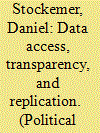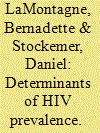|
|
|
Sort Order |
|
|
|
Items / Page
|
|
|
|
|
|
|
| Srl | Item |
| 1 |
ID:
162860


|
|
|
|
|
| Summary/Abstract |
Do researchers share their quantitative data and are the quantitative results that are published in political science journals replicable? We attempt to answer these questions by analyzing all articles published in the 2015 issues of three political behaviorist journals (i.e., Electoral Studies, Party Politics, and Journal of Elections, Public Opinion & Parties)—all of which did not have a binding data-sharing and replication policy as of 2015. We found that authors are still reluctant to share their data; only slightly more than half of the authors in these journals do so. For those who share their data, we mainly confirmed the initial results reported in the respective articles in roughly 70% of the times. Only roughly 5% of the articles yielded significantly different results from those reported in the publication. However, we also found that roughly 25% of the articles organized the data and/or code so poorly that replication was impossible.
|
|
|
|
|
|
|
|
|
|
|
|
|
|
|
|
| 2 |
ID:
099895


|
|
|
|
|
| Publication |
2010.
|
| Summary/Abstract |
Slightly over 25 years since the identification of the virus, Human Immunodeficiency Virus/Acquired Immune Deficiency Syndrome (HIV/AIDS) epidemic has killed millions of people and has expanded to become one of the greatest dangers in the world, threatening individuals, economies, communities and states. To better understand the factors underlying the wide discrepancies in HIV rates across countries, and to better prioritize interventions in the global fight against HIV/AIDS, it is imperative to build sound models that help to identify determinants of worldwide HIV prevalence. While scholars of various disciplines such as political science, anthropology and health studies have engaged in this endeavor, these studies have found divergent results. Seeking to construct a viable model, this current study examines nine theory-informed variables - income inequality, regime type, gender equality, GDP per capita (PPP), control of corruption, per cent Muslims in a country, education, contraceptive use and availability of antiretroviral medication that potentially affect a state's HIV prevalence. This research finds that conditions favorable to a decrease in HIV are low income inequality, a high per cent of Muslims in a country's population and high contraceptive use.
|
|
|
|
|
|
|
|
|
|
|
|
|
|
|
|
| 3 |
ID:
088910


|
|
|
|
|
| Publication |
2009.
|
| Summary/Abstract |
This research bridges two well-established bodies of literature; democratization literature and development literature. Scholars in the first camp frequently focus on the relationship between democracy and economic performance, whereas researchers adhering to the second camp often attempt to establish the link between good governance and sustainable economic and social development. However, both groups fall short of systematically linking the effect of democracy to good governance. Focusing on Africa and Latin America this research fills this gap by examining whether democracy and democratization lead to more responsible and effective governance. Through pooled time-series analysis this article reveals a strong significant effect of democracy on good governance. This article also illustrates that a state's move toward democracy immediately triggers improved governance practices, albeit with a stronger effect on Africa than on Latin America.
|
|
|
|
|
|
|
|
|
|
|
|
|
|
|
|
| 4 |
ID:
171275


|
|
|
|
|
| Summary/Abstract |
This article focuses on two commonly used indicators of turnout, VAP turnout (the number of votes cast as a percentage of the voting-age population) and RV turnout (votes cast as a percentage of the number of registered voters), and discusses possible biases induced by migration flows. Using a global dataset on elections in more than 100 democracies between 1990 and 2012, we tested the potential bias induced by the percentage of resident noncitizens and nationals living abroad on VAP and RV turnout, respectively. Through time-series cross-sectional analysis, we found that the number of resident noncitizens negatively biases VAP turnout, to the extent that a country with 10% noncitizen residents would have turnout underreported by nearly 4 percentage points. In contrast, we found that the number of nationals living abroad does not induce a turnout bias.
|
|
|
|
|
|
|
|
|
|
|
|
|
|
|
|
| 5 |
ID:
098999


|
|
|
|
|
| Publication |
2010.
|
| Summary/Abstract |
Previous studies nearly unanimously agree that civil conflicts are more likely to occur in semi-democracies than in either autocracies or democracies. Through multinomial regression analysis, this article re-evaluates this claim by testing the relationship between regime type and civil conflict for the post-Cold War period. Controlling for the material wealth of a country, the heterogeneity of the population, income inequalities and the size of the state, this research finds that the occurrence of minor intrastate wars (25 to 1000 deaths) and major civil wars (more than 1000 deaths) does not differ between hybrid regimes and autocracies. Only democracies have a significantly lower probability of experiencing intrastate fighting and warfare.
|
|
|
|
|
|
|
|
|
|
|
|
|
|
|
|
|
|
|
|
|